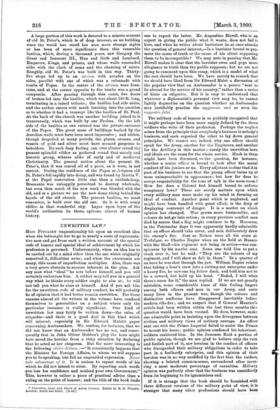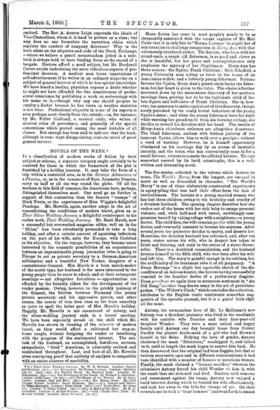UNWRITTEN LAW.*
Miss PITCAIRN unquestionably hit upon an excellent idea when she bethought her to go to nearly a score of representa- tive men and get from each a written account of the special code of honour and special ideal of achievement by which his profession is governed. Unfortunately, when an idea has to be carried out by a mind other than the one which originally conceived it, difficulties arise ; and when the executants are many, this cause of imperfection multiplies. Also, there was a very grave obstacle to success inherent in the plan. Ask any man what "ideal" he sets before himself, and you will certainly embarrass him. A soldier may tell you in a general way what he thinks every soldier ought to aim at ; he will not tell you what he aims at himself. And if you ask him for the unwritten code of military conduct, he will probably he of opinion that it had better remain unwritten. For these reasons almost all the writers in the volume have confined themselves to generalities on a subject where only the particular instance is really significant. One kind of unwritten law may fairly be written down—the rules of etiquette—and there is a good deal in this kind which will interest, especially in Sir Edward Malet's paper concerning Ambassadors. We confess, for instance, that we did not know that an Ambassador has no sex, and conse- quently that in John Oliver Hobbes's play the hero might have saved the heroine from a risky situation by declaring that he acted as her chaperon. But far more interesting is the following °biter dictum :—" It occasionally happens that the Minister for Foreign Affairs, to whom we will suppose you to be speaking, lets fall an unguarded expression. Never take advantage of it. It is useless to repeat words of his which he did not intend to utter. By reporting such words you lose his confidence and mislead your own Government." This, however is rather a piece of practical advice than a ruling on the point of honour; and the title of the book leads • Unwritten Laws and Ideals of Active Careers. Edited by E. H. Pitcairn. London : Smith and Elder. [73.6d.] one to expect the latter. Mr. Augustine Birrell, who is an expert in giving the public what it wants, does not fail it here, and when he writes about barristers he at once attacks the question of general interest,—Is a barrister bound to pro- mote the cause of truth or the cause of his client supposing them to be incompatible ? We may note in passing that Mr. Birrell makes it clear that the barrister owes and pays more allegiance to truth than the public supposes ; but we are not going to comment upon this essay, which is a model of what the rest should have been. We have merely to remark that we should have liked from Sir Edward bfalet a discussion of the popular view that an Ambassador is a person "sent to lie abroad for the service of his country," rather than a series of hints on etiquette. But it is easy to understand that whatever a diplomatist's personal view may be, be cannot lightly dogmatise on the question whether an Ambassador may justifiably practise the suppressio veri or even the suggestio falsi.
The military code of honour is so publicly recognised that it might perhaps have been more amply defined by the three soldiers who write of their profession. Perhaps the neglect arises from the principle that everybody's business is nobody's business, and each expected the other to lay down general principles. We cannot see, indeed, why one officer should speak for the Army, another for the Engineers, and another for the Artillery in this matter ; surely the unwritten laws and ideals are the same for the whole service. Much in them might have been discussed, — the question, for instance, whether a senior officer is bound to look after the moral conduct of his juniors or no. Every adjutant is clear that it is part of his business to see that the young officer turns up at mess unimpeachable in appearance ; but how far does he accept responsibility for the tone of talk in the mesa-room? How far does a Colonel feel himself bound to enforce sumptuary laws ? These are surely matters upon which every military man must make up his mind in forming an ideal of conduct Another point which is neglected, and might have been handled with great effect, is the duty of displaying contempt of danger. It is a matter on which opinion has changed. War grows more businesslike, and colours do not go into action; in every previous conflict men died by scores that a flag might continue to fly. Moreover, in the Peninsular days it was apparently hardly admissible that an officer should take cover, and men deliberately drew the enemy's fire. Just as Nelson wore all his stars at Trafalgar. so Charles Napier when on the field at Busaco with the Staff—his regiment not being in action—was con- spicuous by his scarlet coat. Some one told him to put a cloak over it, but he said : "They are the colours of my regiment, and I will show or fall in them." In a quarter of an hour he was shot through the jaw. William Napier relates that taking a boat's crew into a cutting-out enterprise under a heavy fire, he saw one big fellow duck, and told him not to be a coward, but hold up his head. " Bedad, I will when there's room for it," the man replied. If we are not greatly mistaken, some considerable trace of this feeling lingers among both officers and men in our Army, and costs many lives in the present war, though the colours and distinctive uniforms have disappeared inevitably before modern rifle-fire ; and we suspect that if General Maurice's article had been written within the last three months this question would have been treated. He does, however, make one admirable point in insisting upon the divergence between civilian and military views of military courage. An officer sent out with the Prince Imperial failed to assist the Prince to mount his horse ; public opinion condoned his behaviour, soldiers cashiered him. In the Jameson Raid a portion of public opinion, though we are glad to believe only the vain and foolish part of it, saw heroism in the conduct of officers who disregarded their military obligations in order to take part in a foolhardy enterprise, and this opinion of their heroism was in no way modified by the fact that the raiders, showing a belated common-sense, surrendered after incur- ring a most moderate percentage of casualties. Military opinion was perfectly clear that the business was unsoldierly from its beginning to its ignominious end.
If it is strange that the book should be furnished with three different versions of the military point of view, it is stranger that many other professions should have been omitted. The Rev. A. Austen Leigh expounds the ideals of Vice-Chancellors, whom it is hard to picture as a class; but why does no one formulate the unwritten ethics which regulate the conduct of company directors ? Why is the book silent on the etiquette and code of the Stock Exchange, —where we believe a pencil memorandum jotted in a note. book is always held to have binding force as the record of a bargain. Doctors afford a good subject, but Mr. Brudenell Carter avoids underlining the more ridiculous aspects of pro- fessional decorum. A medical man hears imputations of self-advertisement if he writes in an ordinary magazine on a subject of general interest of which he has special knowledge. We have heard a leading physician express a doubt whether be might not have offended the fine sensitiveness of profes- sional conscience by publishing a work on meteorology with his name to it, —though why any one should propose to employ a doctor because he has views on weather statistics is not clear. Professional etiquette in some of its aspects is seen perhaps most clearly from the ontside,—as, for instance, by Mr. Faller Maitland, a musical critic, who writes of musical rules of precedence, and generally of the special conventions which prevail among the most irritable of all classes. But enough has been said to indicate that the book, although in some ways disappointing, contains much of great general interest.







































 Previous page
Previous page